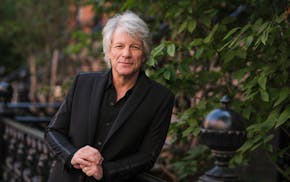Cemeteries have gotten a bad rap because of Halloween and horror movies, local author James Silas Rogers ardently believes. They are not places of spookiness and the macabre; they are places of remembrance and connectedness.
"Cemeteries are never emotionally neutral," he said. "They always have a history of meaning and context, a constellation of stories that swirl around us. You can feel the presence of stories when you enter a cemetery."
Rogers, editor of the New Hibernia Review published by the Center for Irish Studies at the University of St. Thomas, has written a book of essays and poems about cemeteries. "Northern Orchards: Places Near the Dead" muses about graveyards and what makes them special.
"There's something about them that is different from any other place," he said.
On Memorial Day, the aura is stronger than ever. "I've been moved to tears by Memorial Day services," said Rogers, who will be taking part in one at 10 a.m. Monday at Acacia Park Cemetery in Mendota Heights, one of the places he writes about in his book.
What he derisively calls "the Halloween creepiness industry" has changed our perspective on cemeteries, he said. He often finds himself explaining that although he's a taphophile — a cemetery enthusiast — that doesn't mean that he's some sort of weirdo.
"It seems alien to us now, but in the 19th century, cemeteries were public parks," he said. "It was very common for people to go have a picnic Sunday afternoon in a cemetery. There wasn't the separation between the realm of the living and the realm of the dead the way there is today, and I think that's a good thing."
Most cemeteries are surrounded by a fence, which he thinks is important "because it sets them apart as being a special place." But he also likes that those fences aren't "large stone walls that you can't see over. The fences always allow one to see into the cemetery and to see out of it, creating a little bit of conversation between the living and the dead."
Admitting that he's never seen a horror movie — "Unless you count 'Jaws' " — Rogers has "no interest in the undead. The scary images of cemeteries have nothing in common with my experiences. I find them to be places of stillness and reflection."
When he talks about the stories that arise in a cemetery, he's referring not only to the histories of the people buried there, but also to the lives of the people who are visiting. We allow the sacred space "to make a claim on us," he writes. "In that way, I suppose, cemeteries become in the end places where we go to wait for our own stories."
A lifelong bond
Rogers, 61, has been fascinated by cemeteries since he was young.
"My mother would take us to visit our grandparents in Green Isle," a small town southwest of the Twin Cities, he said. "There were only two things to do there: Go down to the railroad trestle and throw rocks at the snakes, or walk to the graveyard."
But it was more than boredom that drew him to the cemetery. He also felt a kinship with the history there.
"In every generation, it falls to one person to be the keeper of memories," he said. "In my family, that job fell to me."
When he visits a cemetery for the first time, he takes an atypical approach.
"The default behavior is to go looking for the oldest headstone," he said. He prefers to stroll through the grounds, studying the headstones and gleaning what information about the deceased that he can from the inscriptions below the names. Then he finds a place to sit and ponder.
"I listen to what the place has to say to me," he said. "It sorts of seeps into you."
Sometimes he takes photographs of the headstones, but his pictures aren't like everyone else's, either.
"Most people focus in tight on the stone so you can read the inscription," he said. "I like to pull back and show what's going on behind the headstone. … Cemeteries are nature preserves in the heart of the city. They also are great repositories of public statuary."
The quest to remember, and forget
While most people go to a cemetery to remember their loved ones, Rogers said that they also help us to forget.
"They facilitate a healing forgetfulness," he said. "For example, cemeteries in Britain. The Victorians worshiped themselves, but they weren't that important. Now we've forgotten them."
By leading us to think about all the people who have gone before us, cemeteries help us put our lives in perspective.
"They make us realize that we're part of a much bigger story," he said, opening his book to quote one of the passages:
"Remembrance needs to lead us away from ourselves and into connectedness and awe before all that is greater than ourselves — not to celebrate the snowflake, but the snowflake falling in the river."
Jeff Strickler • 612-673-7392
Olympian Kristi Yamaguchi is 'tickled pink' to inspire a Barbie doll

After 4 decades in music and major vocal surgery, Jon Bon Jovi is optimistic and still rocking
Rom-com author Emily Henry knows the secret to having a healthy relationship with love

